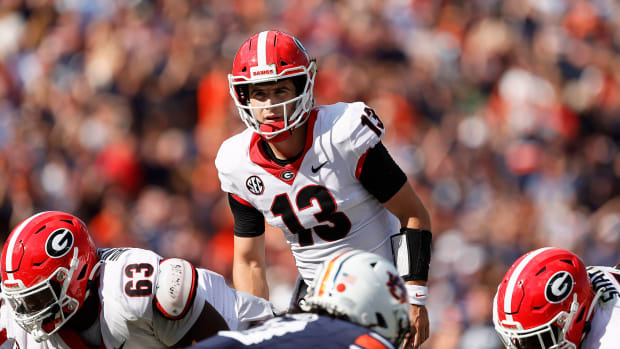Caleb Williams isn't the only backup quarterback who is making a difference in his team's season.
Forty names, games, teams and minutiae making news in college football (antacids sold separately at Louisville, where the last four games—two wins, two losses—have all gone down to the wire):
MORE DASH: One-Loss Contenders | USC's Market
THIRD QUARTER: HOW GOOD IS YOUR BACKUP QUARTERBACK?
In a world of immediately eligible transfers, talented quarterbacks are less likely than ever to stick around if they aren’t starting. Which makes it harder than ever to have depth at that most critical position—a position where injuries are not at all uncommon.
After what befell Penn State (21) Saturday, it’s clear how important quarterback depth can be. When Sean Clifford was injured, the Nittany Lions were sunk at Iowa. Ta’Quan Roberson may end up being a fine college QB, but he wasn’t ready for that admittedly very difficult spot. The guy who had been Penn State’s No. 2 QB, Will Levis, is now the toast of Kentucky, where he is starting for the undefeated Wildcats and doing strange things with food.
A look at nine good situations when it comes to quarterback depth:
Caleb Williams (22), Oklahoma. Touted freshman came off the bench and saved the Sooners from defeat against arch-rival Texas, throwing for 212 yards and two touchdowns and running for 88 and another score. Down 28–7, Oklahoma got an injection of life when Williams took off on a sizzling, 66-yard touchdown run. In the fourth quarter, he also had a breathtaking bomb to Marvin Mims, who made a spectacular catch for a 52-yard TD. The young man is ready. Right now.
(The attendant question that accompanies his arrival as QB1: Did Williams just send erstwhile starter Spencer Rattler (23) into the transfer portal? Speculation already has been humming about where Rattler will play in 2022, provided he doesn’t turn pro—which would seem unwise, given what he’s put on tape. Even though he hasn’t lived up to the pre-college hype, Rattler would be an in-demand transfer.)

John Reed/USA TODAY Sports
Stetson Bennett IV (24), Georgia. He’s played a lot of football for the Bulldogs, throwing 244 passes in three seasons. While Bennett struggled at times last year when thrust into a starting role, he’s been really good when pressed into service by injury to JT Daniels. Bennett’s efficiency rating is a robust 206.56, way up from 2020. He might have played his best game Saturday at Auburn, throwing for 231 yards, two touchdowns and no interceptions. Most importantly, the team and coaching staff have faith in Bennett to get the job done and avoid catastrophes.
Tyler Buchner and Drew Pyne (25), Notre Dame. With the Fighting Irish trailing Virginia Tech 10–0 Saturday, Buchner came in and led two touchdown drives, showcasing his dual-threat dynamism. Third-stringer Pyne played well in relief of injured starter (and Wisconsin transfer) Jack Coan when the Fighting Irish beat the Badgers in late September. Brian Kelly has a long history of dabbling in backup QB managing to get the desired results, and he could spend the second half of this season doing exactly that.
At Michigan State (26), Anthony Russo was the transfer from Temple that a lot of people assumed would win the job. But Payton Thorne has merely been the second-most efficient quarterback in the Big Ten to date. Thorne had some good performances late in the Spartans’ 2–5 season last year, then beat out Russo in a close competition. He’s been impossible to get out of the starting lineup since. Thorne is on pace to break the school’s single-season efficiency record.
Baylor Romney (27), BYU. Starter Jaren Hall missed two games after being injured against Arizona State, and Romney ably picked up the slack in wins over South Florida and Utah State. He was a combined 35 of 44 for nearly 500 yards in those two games, with four touchdowns and no interceptions. Romney was knocked out of the Utah State victory with a concussion and Hall returned to the starting lineup in the loss to Boise State. The Cougars could have a QB conundrum—perhaps even a controversy—heading into a big game at Baylor Saturday.
Zach Calzada (28), Texas A&M. His first few weeks replacing injured Haynes King sure weren’t pretty, and after the Aggies offense flailed in consecutive losses to Arkansas and Mississippi State, Calzada had a legion of critics. But he won them over in a big way in the huge upset of Alabama Saturday night, throwing for 285 yards and three touchdowns. After A&M lost a lead it had held virtually all night, falling behind 38–31 with five minutes remaining, Calzada led two scoring drives to rip the game back away from the Crimson Tide. He completed 6 of 8 passes on those final two possessions and had a key run as well.
Casey Thompson (29), Texas. First-year Longhorns coach Steve Sarkisian went with Hudson Card as his season-opening starter, and that proved to be the wrong choice after two games. Thompson took over from there and has been productive, throwing for more than 1,000 yards and 14 touchdowns on the season. He had five TD passes and 388 yards against Oklahoma, but the Texas defense couldn’t hold up its end of the bargain in another Red River thriller.
(Both Red River combatants could see benched Week 1 starters on the move after this season, if Rattler and Card opt to look elsewhere for playing time.)
San Diego State (30) is undefeated while playing two quarterbacks this season. Neither Jordon Brookshire nor Lucas Johnson has lit it up passing—they have combined to throw for just 585 yards in five games, with four touchdowns and two interceptions—but they’ve been effective runners (184 yards and four TDs) while directing Brady Hoke’s ground-and-pound offense.
MORE DASH: One-Loss Contenders | USC's Market